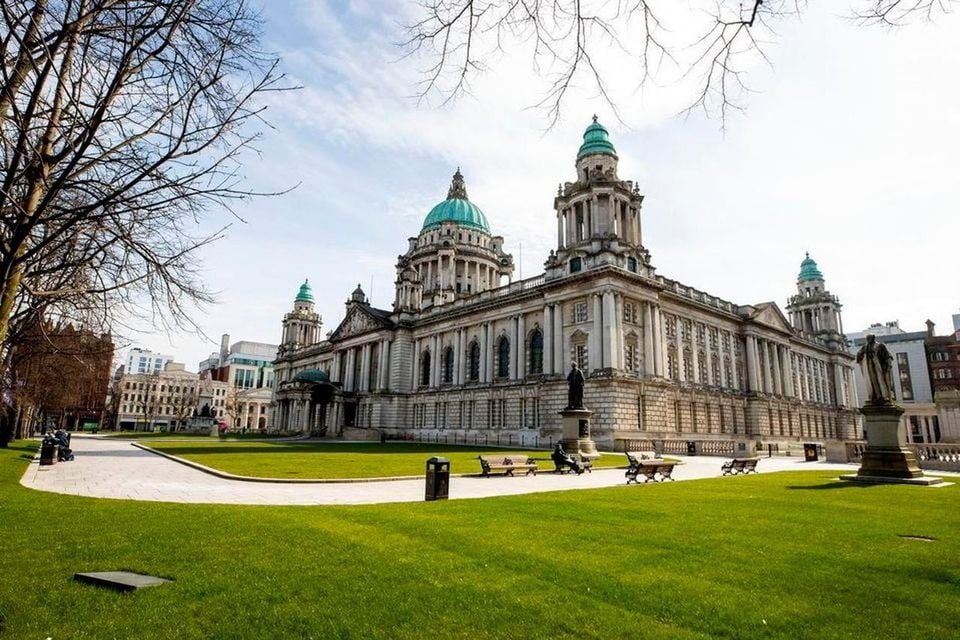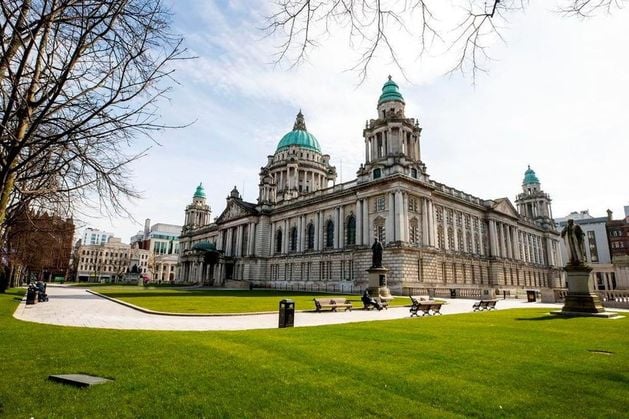A spokesperson for the party said that “the required number of signatures has been obtained”.
“The text has been agreed and the call-in should be with Belfast City Council’s solicitor tonight [Thursday],” they continued.
“It is signed by councillors from TUV, DUP and UUP.”
It comes after DUP councillor Sarah Bunting said on Wednesday evening that “united unionist representatives in this council we have all signed a legal call in on tonight’s decision”.
Her comments were made directly after a vote in favour of adopting a new draft Irish language policy, which would lead to more widespread use of the language throughout Belfast.
The policy’s aim is to promote greater visibility of the Irish language by requiring English-Irish signage in council facilities and a bilingual logo on vehicles and uniforms.
A DUP proposal for no changes to be made to staff uniforms failed during the sitting. The motion was defeated by 42 votes to 17.
DUP leader Gavin Robinson rejected any suggestion his party’s opposition the new policy is motivated by “anti-Irish” sentiment.
He said the policy was “wholly disproportionate” and would lead to the “squandering” of nearly £2m of public money.
Mr Robinson said: “It’s not anti-Irish to talk about services in the city, to talk about good use of ratepayers’ money. If there was £1.9m lying around as an underspend, as has been claimed, it should have been returned to the hard-pressed ratepayers of Belfast, rather than squandered on an unnecessary change of their corporate identity. It’s not necessary.
“It’s not anti-Irish (the DUP stance). Anybody that wants to engage in that language, anybody that wants to enjoy it, is free to do so in this city of ours, but they don’t need to impose it on others who have no interest.”
A ‘legal call-in’ in the context of local government in Northern Ireland refers to a mechanism that allows members of a council to require reconsideration of certain key decisions, under defined conditions.
It was introduced by the Local Government (Northern Ireland) Act 2014 and is intended as a check or safeguard on council decision-making.
There are currently 17 councillors in Belfast City Council from the three unionist parties opposed to the Irish policy.
A request for a call-in must be made by 15% of councillors. In Belfast City Council, the requirement is at least nine councillors.
When a valid call-in is made, the decision is put on hold until councillors look at it again.
The council must add the decision to the agenda of the next meeting for reconsideration.
If the call-in is about “community impact” and a legal opinion agrees the concern is valid, the decision will only go through if 80% of councillors present support it.
If the legal opinion says the concern isn’t valid, the original decision goes ahead.
Terror case against Kneecap’s Mo Chara thrown out
Various councils across Northern Ireland have adopted Irish language policies and additional procedures specifically related to dual-language street signage.
Armagh City, Banbridge and Craigavon Borough (ABC Council), Ards and North Down Borough, Causeway Coast and Glens and Lisburn and Castlereagh City councils all have a dual-language street signage policy, allowing for Irish and Ulster Scots language signs – but only where a super majority of residents (usually 66%) support them. An initial petition of around a third is required to begin this process.
In all of the above council policies, if a resident does not respond to the council-posted survey, they are recorded as being against the application for dual language street signage. Should an application for dual language street signage be unsuccessful in all of the above councils, a ban is placed on reapplication for a period of between one to five years.

Belfast City Hall
News Catch Up – Thursday 2 October
Derry City and Strabane District Council has a specific Irish language policy that promotes and facilitates the use of Irish in its services, including signage and documentation. They recently ratified a new street signage policy based on the 15% minority threshold in place in Belfast, as recommended by the United Nations experts on minority issues.
Fermanagh and Omagh District Council also has an Irish language policy complemented by a five-year Irish Language Strategy (2021–2026) and an associated implementation plan.
In November 2023, Newry, Mourne and Down District Council re-adopted their longstanding bilingualism policy alongside an Irish language strategy for the period 2024–2027. That extends to services, logos and signage. That council also has a dual-language street signage policy which erects signage on streets where a majority of respondents to the survey vote in favour.
In May of this year, the council also approved the installation of dual language signs in Irish and English for 89 communities across counties Armagh and Down.
Mid Ulster District Council’s official Irish language policy promotes the use, learning, and cultural recognition of and facilitation of services through Irish across the district. They also have a separate policy for dual language street signage, based on the model in place in Newry, Mourne and Down…
Mid and East Antrim Borough Council currently has no specific policy for the Irish language, nor does it have a policy for dual-language street signage, making it the only council not to have implemented such a policy
Councils’ language policies are guided by the European Charter for Regional Minority Languages, ratified by the UK Government for Irish as a result of the Good Friday Agreement. Guidance from the Department of Communities for local councils published in 2016 sets out the guiding principles of the Charter that should be considered by councillors when developing Irish language policies.

